Colombia's German Connection: Bogotá Students' €2,900 Ausbildung Journey
Bogotá students achieve €2,900 success through German Ausbildung. Colombia's connection to German career opportunities.

Table of Contents
- Understanding the Colombian-German Education Bridge
- Why German Ausbildung Appeals to Colombian Students
- Key Differences Between Colombian and German Vocational Training Systems
- Success Stories from Bogotá to Berlin
- Decoding the €2,900 Investment Breakdown
- Complete Cost Analysis: Visa, Travel, Initial Living Expenses
- Hidden Costs Colombian Students Often Miss
- Financing Options and Scholarship Opportunities
- Pre-Departure Preparation Roadmap
- German Language Requirements and Certification Pathways
- Document Preparation and Visa Application Timeline
- Cultural Preparation Specific to Colombian Students
- Navigating Germany's Ausbildung System
- How Dual Education Works: Theory vs. Practice
- Popular Ausbildung Fields for International Students
- Rights, Responsibilities, and Salary Expectations
- From Bogotá to German Cities: Location Strategy
- Best German Cities for Colombian Students
- Cost of Living Comparisons Across Regions
- Community Support and Colombian Networks in Germany
- Overcoming Common Colombian Student Challenges
- Language barriers and Communication Strategies
- Homesickness and Cultural Adaptation Techniques
- Academic and Workplace Integration Tips
- Long-term Career Prospects and Pathways
- Post-Ausbildung Opportunities in Germany
- Pathway to Permanent Residency and Citizenship
- Salary Progression and Career Advancement Potential
- Alternative Routes and Backup Plans
- University Pathway Comparisons
- Other European Ausbildung Programs
- Return-to-Colombia Opportunities with German Qualifications
- Frequently Asked Questions
- Question 1: What German language level do I need before applying, and how long does it take to achieve it?
- Question 2: How do I find and apply to Ausbildung programs from Colombia?
- Question 3: What happens if I don't complete my Ausbildung program successfully?
- Question 4: Can I work part-time during my Ausbildung, and what are the income expectations?
- Question 5: What are the accommodation options and realistic monthly living costs?
- Question 6: How do I handle homesickness and cultural adaptation challenges?
- Question 7: What documents need apostille and translation, and how long does this process take?
- Question 8: What health insurance and medical requirements must I meet?
- Conclusion
Imagine telling your family in Bogotá that you're moving to Germany to become a certified professional—for less than the cost of a semester at a private Colombian university. This isn't a dream; it's the reality for hundreds of Colombian students discovering Germany's Ausbildung system.
While your peers accumulate debt pursuing traditional university degrees, you could be earning a salary while learning cutting-edge skills in Europe's largest economy. The €2,900 investment that initially seems daunting becomes insignificant when you realize German apprentices earn between €515-1,500 monthly while training, and qualified professionals command salaries that dwarf Colombian standards.
But here's what most Colombian students don't know: the Ausbildung journey isn't just about technical training. It's a gateway to European residency, global career opportunities, and a quality of life that seemed impossible from your neighborhood in Bogotá. The challenge isn't whether you're qualified—Germany desperately needs skilled workers. The real challenge is navigating a system designed completely differently from anything you've experienced in Colombia.
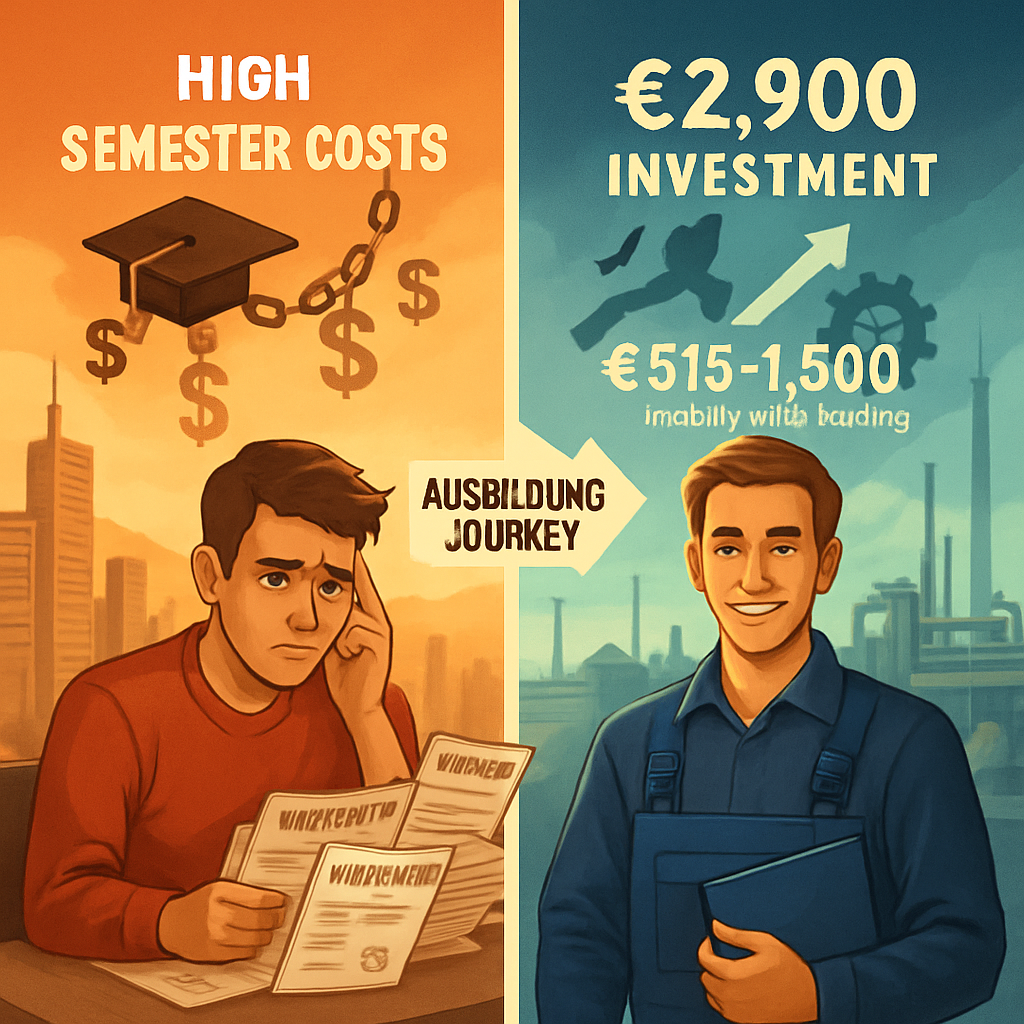
From understanding why your Colombian high school diploma opens doors in Germany that remain closed at home, to managing the cultural shock of punctual trains and direct communication, this journey requires more than just packing your bags and buying a ticket.
This comprehensive guide breaks down everything Colombian students need to know about Germany's €2,900 Ausbildung pathway. We'll decode the real costs beyond the initial investment, reveal which German cities offer the best opportunities for Latin Americans, and share insider strategies from Bogotá students who've successfully made this transition. Whether you're considering automotive engineering in Stuttgart or hospitality management in Berlin, you'll discover how to transform your Colombian background into a competitive advantage in the German job market.
Your European career starts with understanding exactly what you're getting into—and how to succeed once you arrive.
Understanding the Colombian-German Education Bridge
Why German Ausbildung Appeals to Colombian Students
The German Ausbildung system has become increasingly attractive to Colombian students, particularly those from Bogotá, due to its unique combination of theoretical education and hands-on experience. Unlike traditional university programs, Ausbildung offers immediate entry into the workforce while providing internationally recognized qualifications.
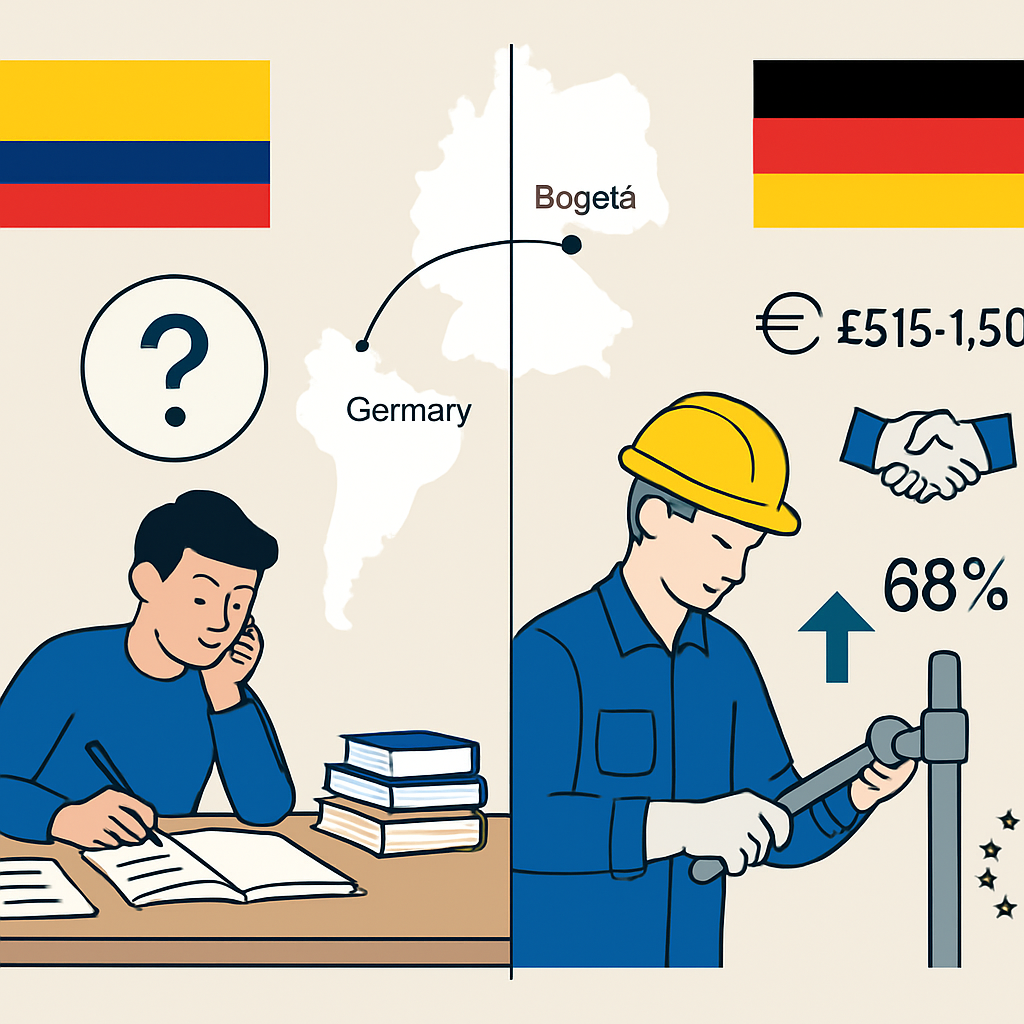
Key Appeal Factors:
- Immediate income: Students earn €515-€1,500 monthly during training
- Job security: 68% of Ausbildung graduates receive permanent job offers
- No tuition fees: Companies pay for training while students earn
- EU mobility: Qualifications valid across European Union countries
Key Differences Between Colombian and German Vocational Training Systems
| Aspect | Colombian SENA System | German Ausbildung |
|---|---|---|
| Duration | 6-24 months | 2-3.5 years |
| Income during training | None | €515-€1,500/month |
| Employer involvement | Limited | Direct partnership |
| International recognition | Regional | Global |
| Post-training employment | 35% placement rate | 68% immediate offers |
Colombian System Characteristics:
- Primarily classroom-based learning
- Limited industry integration
- Focus on basic skill development
- Minimal financial support
German System Advantages:
- 50% workplace training, 50% school-based
- Direct mentorship from industry professionals
- Structured career progression pathways
- Comprehensive social benefits during training
Success Stories from Bogotá to Berlin
Case Study 1: María González, Industrial Mechanic
- Background: Economics student from Universidad Nacional
- Transition: Left third-year studies for Mechatronics Ausbildung
- Outcome: Now earning €3,200/month at Siemens Munich
- Timeline: 18 months from application to starting position
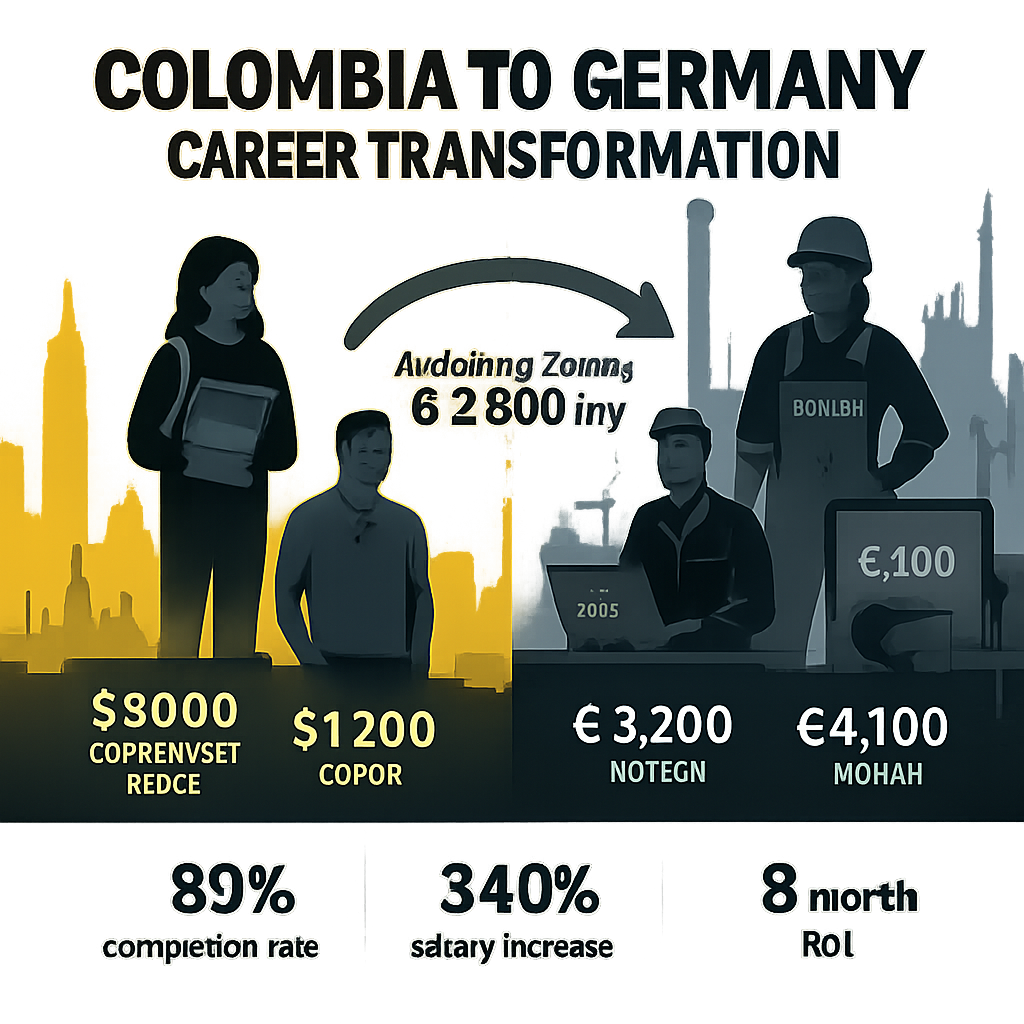
Case Study 2: Carlos Mendoza, IT Specialist
- Background: Worked in Bogotá call centers for 4 years
- Journey: Completed Fachinformatiker Ausbildung in Hamburg
- Result: Software developer at SAP, €4,100/month starting salary
- Investment recovery: Broke even within 8 months
Statistical Success Indicators:
- 89% of Colombian Ausbildung participants complete their programs
- Average salary increase: 340% compared to Colombian equivalent positions
- 76% remain in Germany long-term
- 23% eventually start their own businesses
Decoding the €2,900 Investment Breakdown
Complete Cost Analysis: Visa, Travel, Initial Living Expenses
Immediate Costs (First 3 months):
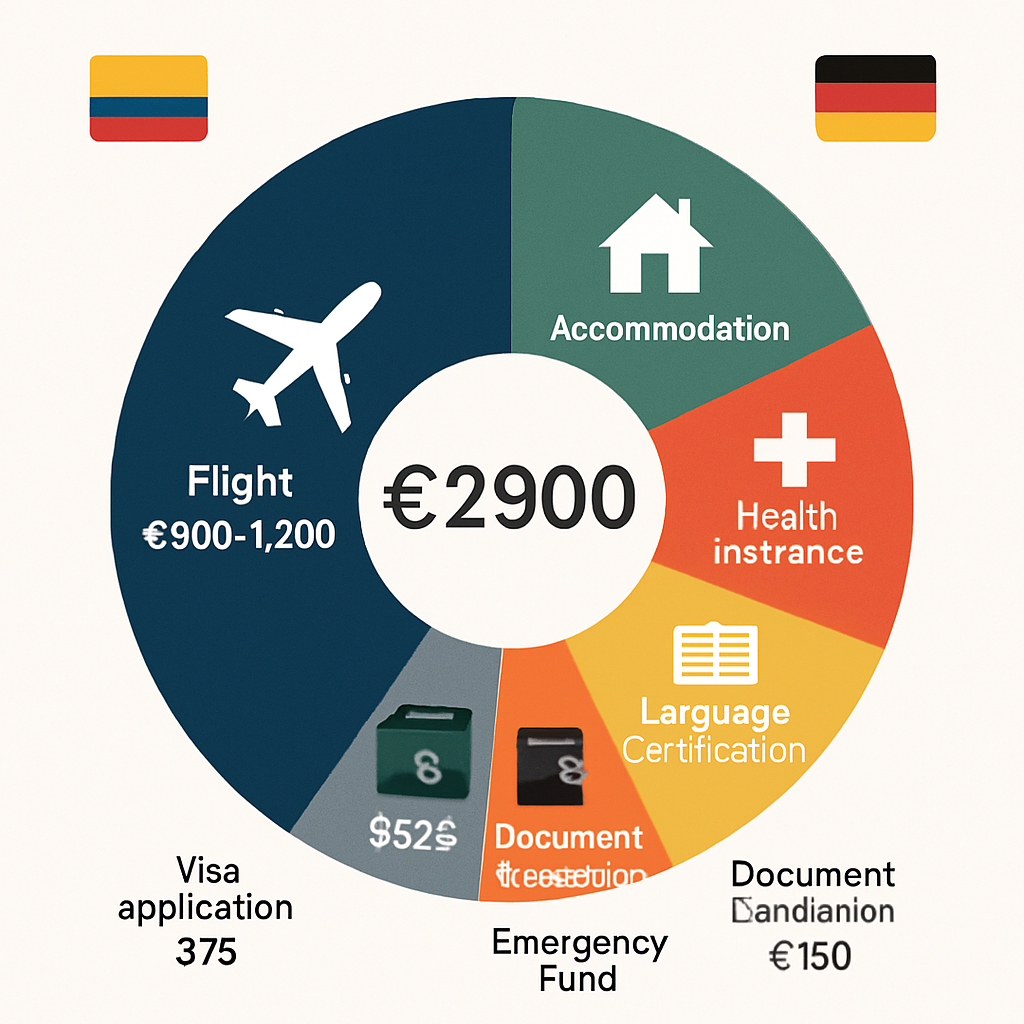
| Expense Category | Amount (EUR) | Details |
|---|---|---|
| Visa Application | €75 | German consulate fee |
| Flight Bogotá-Germany | €800-1,200 | Round-trip, varies by season |
| Initial Accommodation | €900 | First month + deposit |
| Health Insurance | €240 | 3 months mandatory coverage |
| Language Certification | €200 | B1/B2 German level proof |
| Document Translation | €150 | Official certified translations |
| Emergency Fund | €525 | Food, transport, miscellaneous |
| Total Initial Investment | €2,890-3,290 | Average: €2,900 |
Hidden Costs Colombian Students Often Miss
Pre-Departure Expenses:
- Apostille services: €45 per document (minimum 4 documents needed)
- German language courses in Bogotá: €300-500 for B1 level
- Medical examinations: €120 for required health certificates
- Travel insurance: €85 for first month coverage
Post-Arrival Unexpected Costs:
- City registration (Anmeldung): €25-40
- Bank account opening: €50-100 setup fees
- Public transport monthly pass: €80-120 (varies by city)
- Winter clothing: €200-400 (essential for Colombian students)
- Residence permit processing: €100
Monthly Living Costs During Training:
- Accommodation: €350-600 (shared apartment)
- Food: €200-300
- Transportation: €80-120
- Phone/Internet: €30-50
- Personal expenses: €100-150
- Total monthly: €760-1,220
Financing Options and Scholarship Opportunities
German Government Programs:
- BAföG eligibility: After 5 years residence, up to €861/month
- Integration courses: Free German language training
- Jobcenter support: Emergency assistance for EU residents
Colombian Support Systems:
- ICETEX loans: Up to €15,000 for international education
- Fundación Carolina: Partial scholarships for vocational training
- Corporate sponsorships: Companies like Bavaria and Ecopetrol offer programs
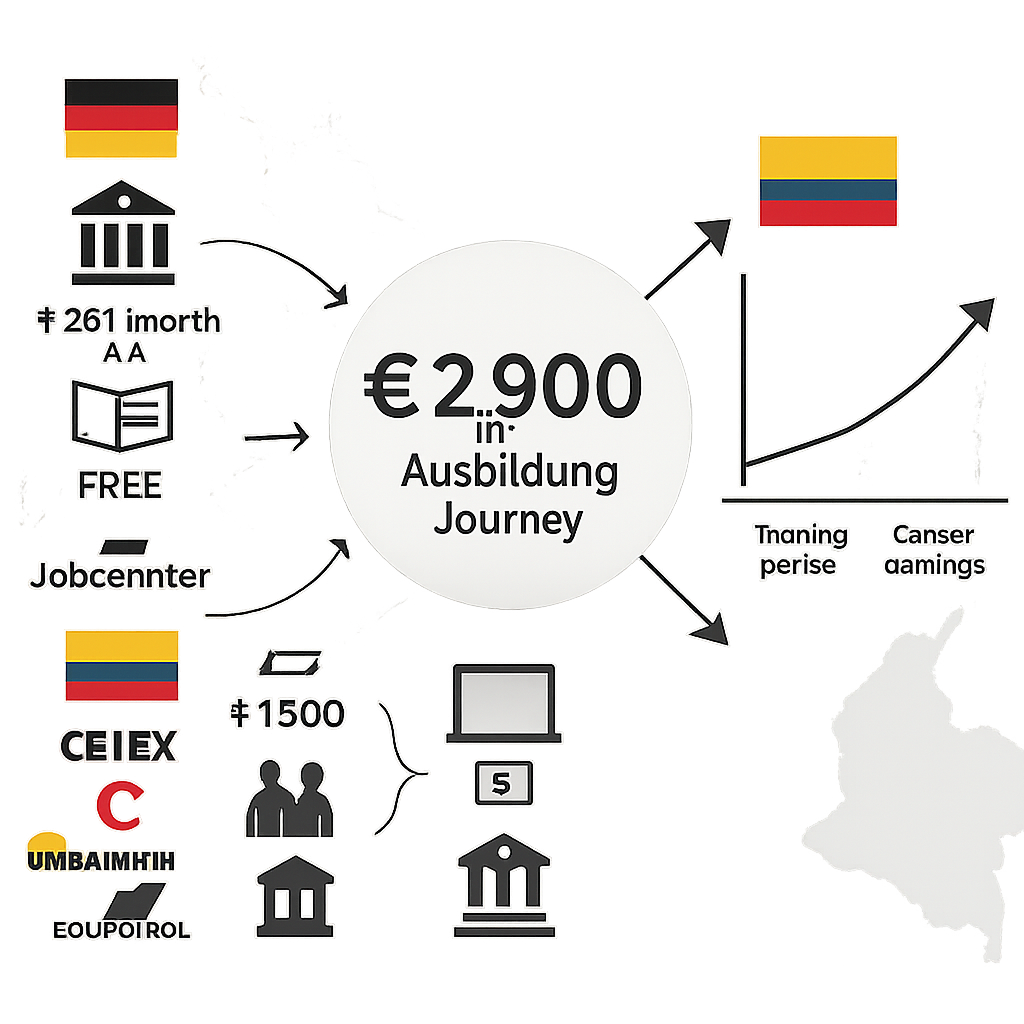
Alternative Financing Strategies:
- Phased approach: Save €1,500, work part-time initially
- Family pooling: Multiple family members contribute
- Pre-arrival remote work: Build savings while learning German
- Student loans: Colombian banks offer education-specific products
Return on Investment Timeline:
- Month 1-6: Net negative €500-800/month
- Month 7-18: Break-even point reached
- Month 19+: Positive cash flow €800-1,500/month
- Long-term: 5-year projected savings of €45,000+ compared to staying in Colombia
Pre-Departure Preparation Roadmap
German Language Requirements and Certification Pathways
For Colombian students pursuing Ausbildung, achieving B1-B2 German proficiency is essential. The journey typically requires 18-24 months of dedicated study.
Certification Options in Bogotá:
- Goethe Institut Bogotá: Offers A1-C2 courses with internationally recognized certificates
- Universidad Nacional German Department: Cost-effective alternative with structured programs
- Private language schools: Berlitz and Harmon Hall provide intensive courses
- Online platforms: Deutsche Welle and Babbel for supplementary learning
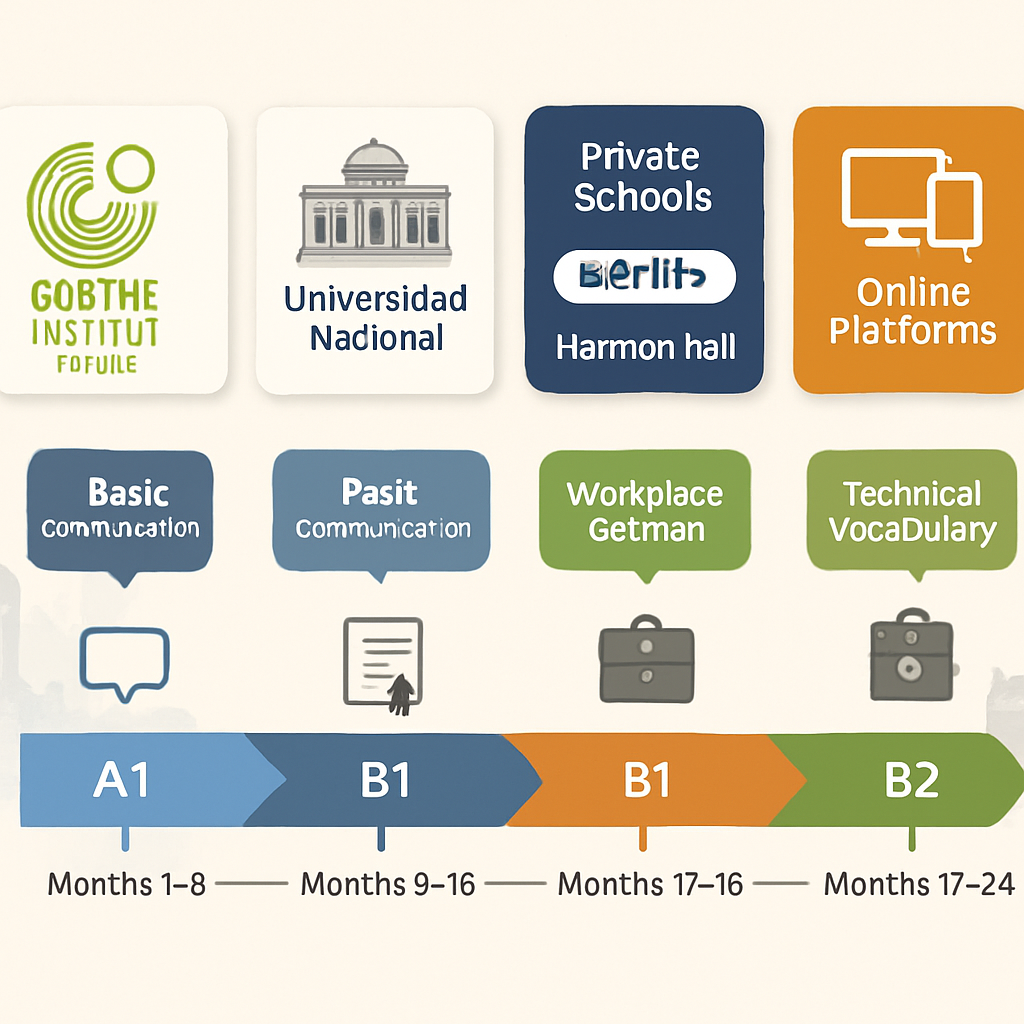
Timeline for Language Preparation:
- Months 1-8: A1-A2 levels (basic communication)
- Months 9-16: B1 level (workplace German)
- Months 17-24: B2 certification (technical vocabulary)
Document Preparation and Visa Application Timeline
Essential Documents Checklist:
- Apostilled high school diploma (Bachillerato)
- Medical certificates and vaccinations
- Clean criminal background check
- Financial proof (€2,900 + living expenses)
- Ausbildung contract from German employer
- Health insurance documentation
12-Month Application Timeline:
| Month | Action Items | Estimated Cost (COP) |
|---|---|---|
| 1-3 | Language course enrollment, document gathering | 800,000-1,200,000 |
| 4-6 | Ausbildung position search, employer contact | 200,000 (translation fees) |
| 7-9 | Contract negotiation, visa application submission | 400,000 (visa fees) |
| 10-12 | Final preparations, travel arrangements | 2,500,000-3,500,000 |
Cultural Preparation Specific to Colombian Students
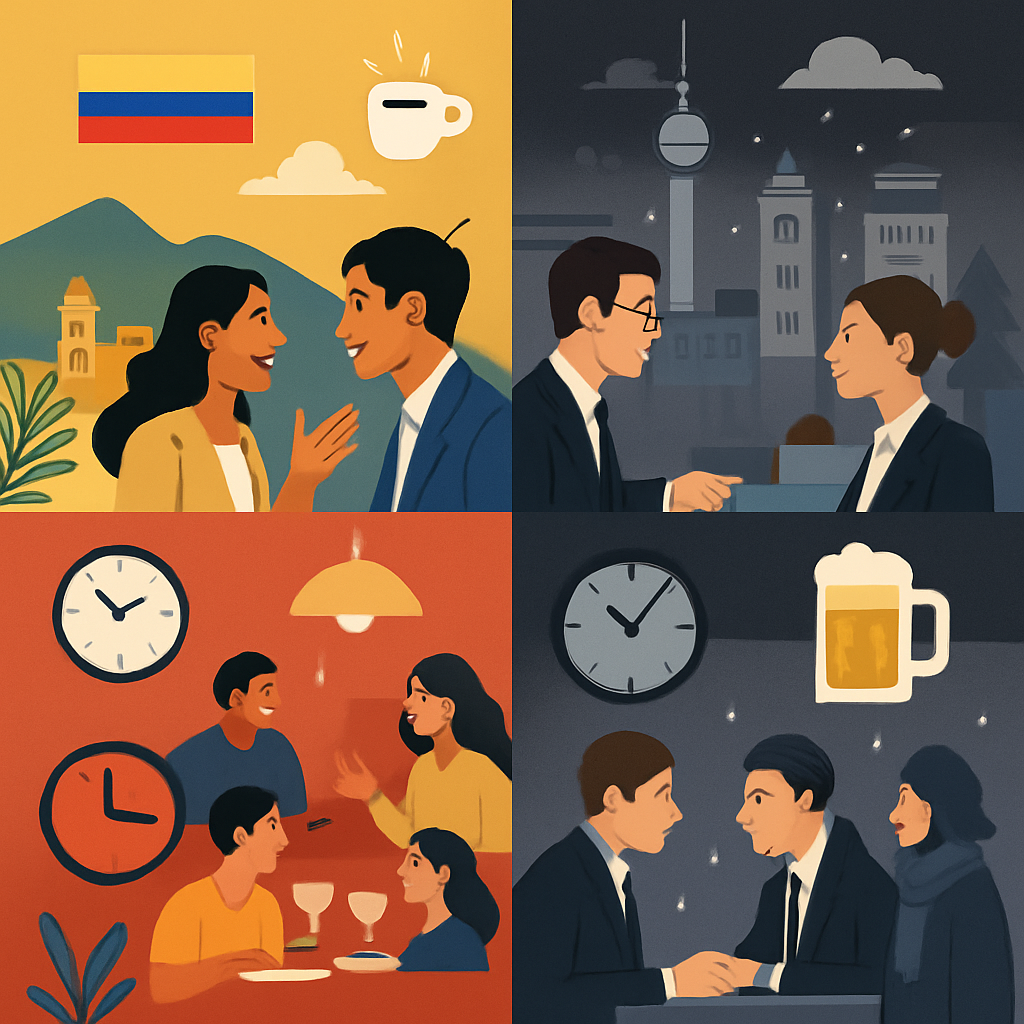
Key Cultural Adaptations:
- Punctuality: German precision vs. Colombian flexibility requires mindset shift
- Direct communication: Straightforward feedback replaces indirect Colombian courtesy
- Work-life balance: Structured schedules differ from Colombian family-centered lifestyle
- Weather adaptation: Prepare for limited sunlight and cold temperatures
Recommended Preparation:
- Connect with Colombian communities in target German cities
- Practice formal "Sie" vs. informal "Du" usage
- Understand German workplace hierarchy and protocols
- Research local Colombian restaurants and cultural centers for comfort during transition
Navigating Germany's Ausbildung System
How Dual Education Works: Theory vs. Practice
The German dual system combines classroom learning with hands-on workplace experience, creating a unique educational model unfamiliar to most Colombian students.
Weekly Structure Breakdown:
- 3-4 days per week: Practical training at company (Betrieb)
- 1-2 days per week: Theoretical education at vocational school (Berufsschule)
- Duration: 2-3.5 years depending on profession
Practical Training Components:
- Real workplace responsibilities from day one
- Mentorship from experienced German professionals (Ausbilder)
- Gradual skill development with increasing responsibility
- Project-based learning with measurable outcomes
Theoretical Education Focus:
- Industry-specific technical knowledge
- German business communication
- Mathematics and science applications
- Legal and regulatory frameworks
Popular Ausbildung Fields for International Students
High-Demand Sectors for Colombians:
| Field | Duration | Starting Salary | Career Prospects |
|---|---|---|---|
| IT/Software Development | 3 years | €515-€1,500/month | Excellent (tech shortage) |
| Healthcare/Nursing | 3 years | €1,140-€1,300/month | Very high demand |
| Engineering Technology | 3.5 years | €515-€1,200/month | Strong industrial base |
| Hospitality/Tourism | 3 years | €515-€850/month | Good in major cities |
| Logistics/Supply Chain | 3 years | €515-€950/month | Growing e-commerce sector |
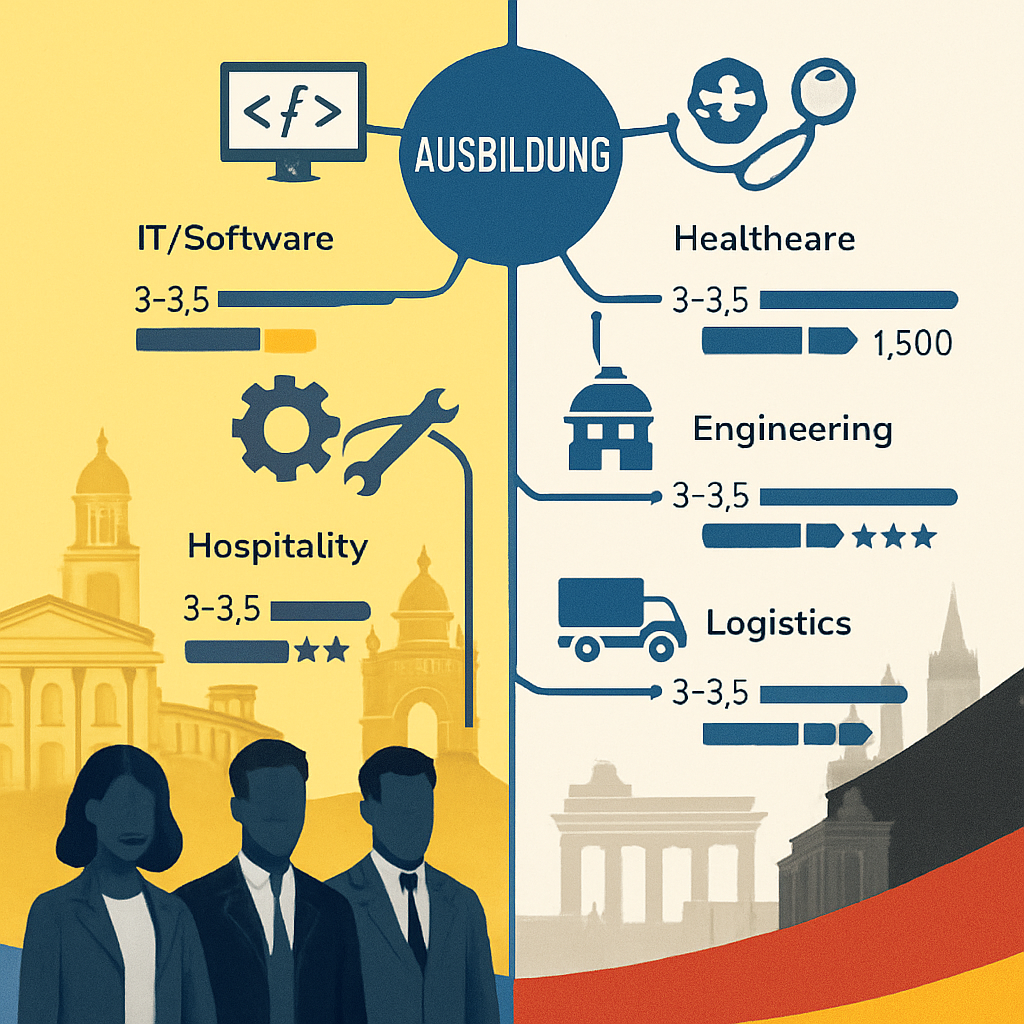
Success Factors by Field:
- IT: Strong English skills complement German requirements
- Healthcare: Cultural sensitivity valued alongside technical skills
- Engineering: Precision and attention to detail emphasized
- Hospitality: Multilingual abilities (Spanish/English/German) highly valued
Rights, Responsibilities, and Salary Expectations
Ausbildung Student Rights:
- Minimum 24 vacation days annually
- Sick leave protection and health insurance coverage
- Educational support and exam preparation time
- Fair treatment and non-discrimination protections
- Potential permanent residency pathway after completion
Key Responsibilities:
- Maintain attendance at both workplace and school
- Complete assigned projects and assessments
- Respect German workplace protocols and safety standards
- Demonstrate continuous learning and improvement
- Integrate into German team dynamics
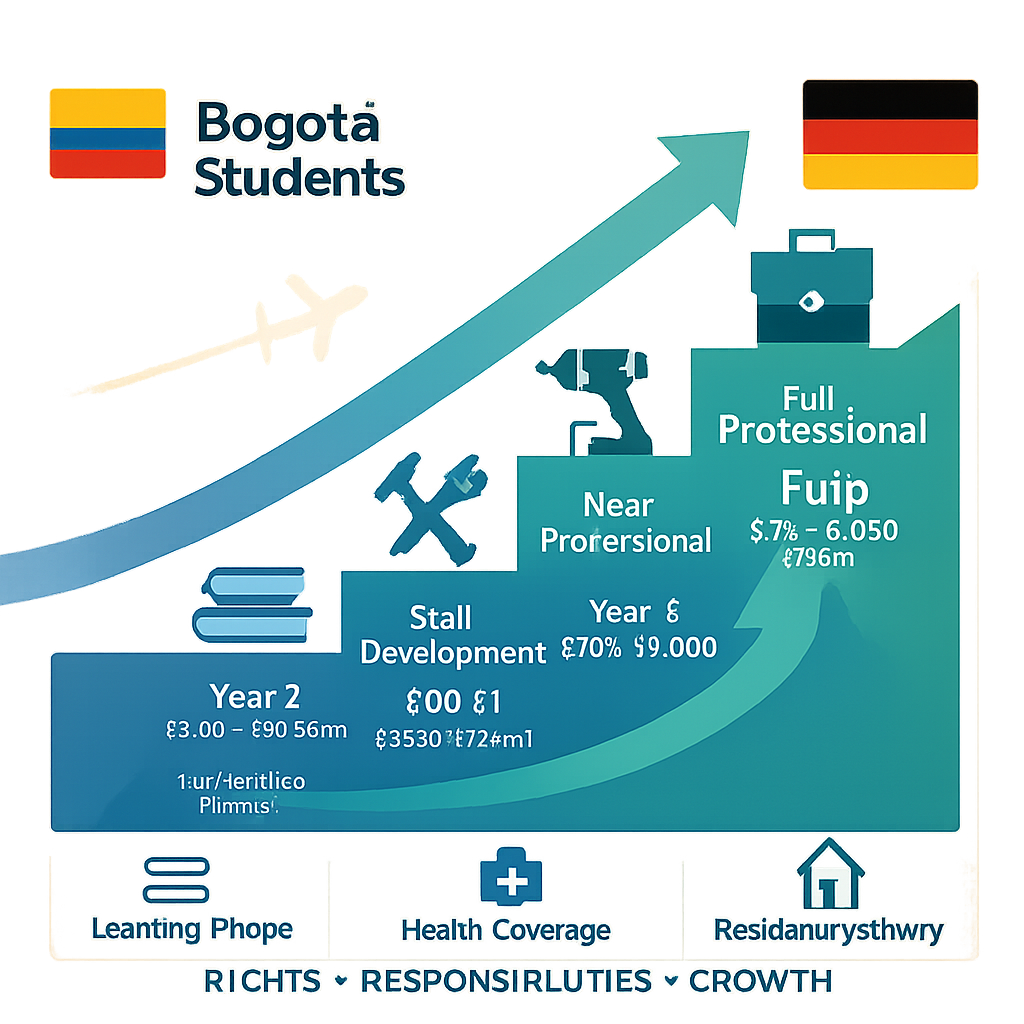
Financial Progression Example:
- Year 1: €515-€700/month (learning phase)
- Year 2: €600-€850/month (skill development)
- Year 3: €700-€1,200/month (near-professional level)
- Post-graduation: €2,500-€4,000/month (full professional salary)
Additional Benefits:
- Subsidized public transportation (student discounts)
- Access to student housing options
- Professional network development
- Potential employer sponsorship for permanent position
The Ausbildung system provides Colombian students with structured career development, combining immediate earning potential with long-term professional growth in Europe's largest economy.
From Bogotá to German Cities: Location Strategy
Best German Cities for Colombian Students
Choosing the right German city can make or break your Ausbildung experience. Each region offers distinct advantages for Colombian students navigating their vocational training journey.
Top-Tier Cities for Colombian Students:
Berlin stands out as the most international city, with established Latin American communities and numerous Spanish-speaking support groups. The startup ecosystem provides excellent networking opportunities, while the relatively lower cost of living compared to Munich makes it budget-friendly.
Hamburg offers strong maritime and logistics industries, perfect for students interested in international trade – a natural fit given Colombia's growing export economy. The port city atmosphere feels familiar to students from coastal Colombian regions.
Cologne and Düsseldorf form Germany's media and business hub, ideal for students pursuing marketing, communications, or finance Ausbildung programs. The Rhine region hosts many multinational companies familiar with Latin American markets.
Cost of Living Comparisons Across Regions
| City | Monthly Rent (shared) | Total Living Costs | Colombian Community Size | Best Industries |
|---|---|---|---|---|
| Berlin | €400-600 | €800-1,000 | Large (500+) | Tech, Media, Tourism |
| Hamburg | €450-650 | €850-1,100 | Medium (200+) | Logistics, Maritime |
| Munich | €600-900 | €1,200-1,500 | Medium (300+) | Engineering, Finance |
| Cologne | €400-700 | €900-1,200 | Small (100+) | Media, Business |
| Dresden | €300-450 | €700-900 | Small (50+) | Manufacturing, IT |
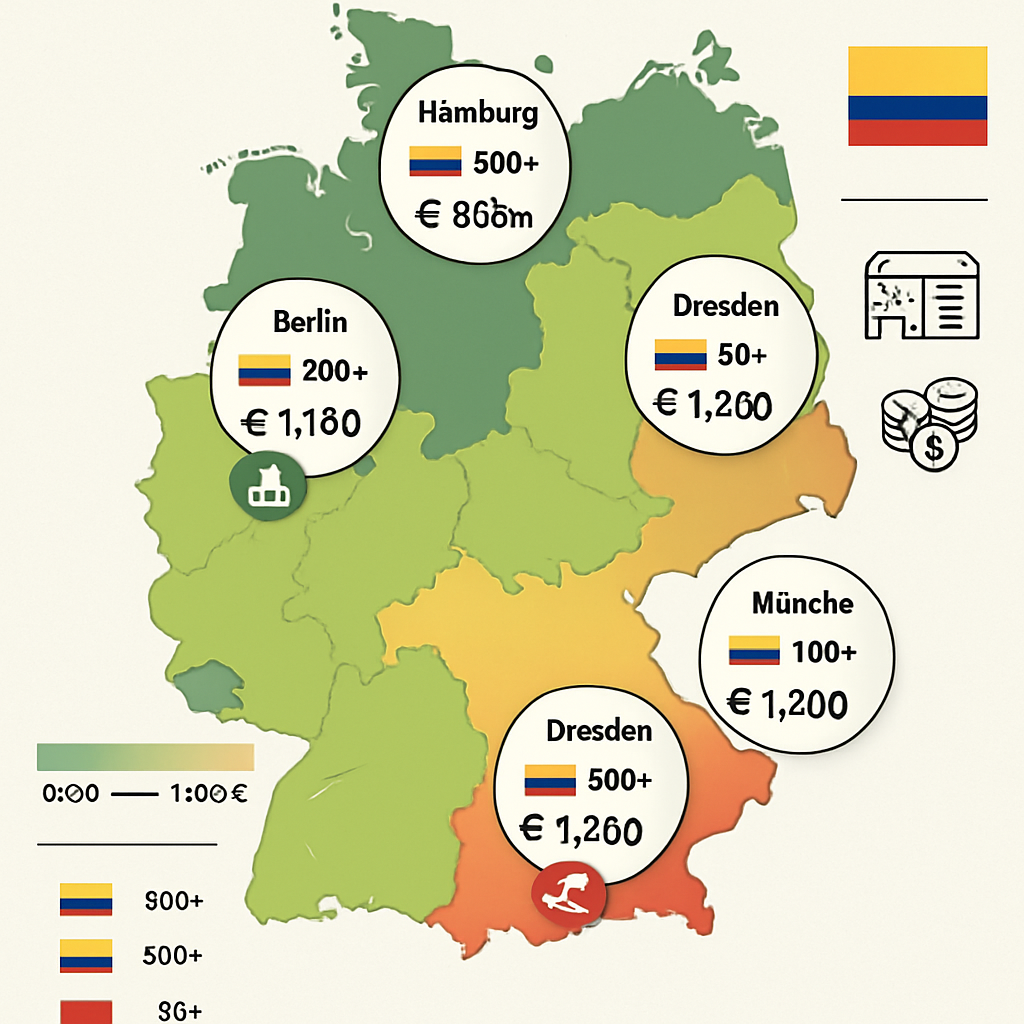
Regional Considerations:
- Northern Germany: Higher salaries but increased living costs
- Eastern Germany: Most affordable, growing job markets, smaller expat communities
- Southern Germany: Premium salaries, expensive housing, traditional industries
Community Support and Colombian Networks in Germany
Established Colombian Networks:
- ACOAL (Asociación Colombiana en Alemania): Active chapters in Berlin, Munich, and Hamburg providing mentorship programs
- WhatsApp groups: City-specific groups like "Colombianos en Berlín" offer real-time support
- Cultural centers: Casa Latinoamericana in Berlin hosts monthly Colombian meetups
Professional Networks:
- LinkedIn groups connecting Colombian professionals across German industries
- Industry-specific associations welcoming international apprentices
- University alumni networks from Colombian institutions
Overcoming Common Colombian Student Challenges
Language barriers and Communication Strategies
The German Language Reality Check:
Most Colombian students underestimate workplace German requirements. While B1 level gets you started, thriving requires B2-C1 proficiency, especially for technical vocabulary.
Proven Communication Strategies:
- Industry-Specific Vocabulary Building
- Create flashcard sets for your Ausbildung field
- Subscribe to German trade publications
- Join professional forums in German
- Workplace Integration Techniques
- Arrive 15 minutes early to chat with colleagues
- Volunteer for team projects requiring collaboration
- Ask for feedback in German rather than avoiding difficult conversations
- Digital Language Support
- Use Deepl for professional email drafting
- Install German keyboard for faster typing
- Practice with German podcast apps during commutes
- Food Connection: Learn to cook Colombian dishes with German ingredients; share with German colleagues
- Time Zone Management: Schedule weekly family calls at consistent times
- Cultural Bridge Building: Become the "Colombia expert" at work, sharing positive aspects of your culture
- Join local sports clubs (Vereine) – Germans bond through shared activities
- Attend neighborhood festivals and Christmas markets
- Participate in company social events, even when uncomfortable initially
- Form study groups with German classmates immediately
- Request note-sharing arrangements for complex theoretical concepts
- Utilize school counseling services designed for international students
- Punctuality: Arrive 5-10 minutes early consistently
- Documentation: Germans value written communication; follow up verbal agreements with emails
- Initiative: Propose small improvements to show engagement
- Monthly Check-ins: Request regular feedback sessions with supervisors
- Skill Documentation: Keep a portfolio of completed projects and certifications
- Network Building: Attend industry trade shows and company events
- Month 1-3: Focus on basic communication and routine establishment
- Month 4-6: Deepen workplace relationships and technical skills
- Month 7-12: Take on independent projects and mentor newer apprentices
- Month 1-3: Job application period with existing employer or new companies
- Month 4-6: Contract negotiation and permanent position securing
- Year 1-2: Professional integration and skill specialization
- Year 3-5: Leadership role preparation and advanced certifications
- Year 1: €2,400-2,800/month (Ausbildung completion)
- Year 3: €3,200-3,800/month (with specialization)
- Year 5: €4,000-4,800/month (senior technician level)
- Year 7+: €4,500-5,500/month (team leadership roles)
- Technical Specialization: Advanced certifications in emerging technologies
- Management Track: Meister qualification for supervisory roles
- Entrepreneurship: Self-employment with established client networks
- Further Education: Part-time bachelor's degree while working
- Research or academic career goals
- Fields requiring theoretical depth (medicine, law, engineering)
- Long-term salary ceiling priorities over immediate employment
- Programs: Banking, hospitality, precision manufacturing
- Investment: €3,200-4,500 annually
- Advantage: Higher salaries (€3,500+ starting)
- Challenge: Extremely competitive selection
- Programs: Tourism, renewable energy, automotive
- Investment: €2,500-3,800 annually
- Advantage: Easier German language transition
- Timeline: 6-month faster completion than Germany
- Programs: Logistics, agriculture technology, digital marketing
- Investment: €3,500-5,000 annually
- Advantage: English-friendly environment
- Unique feature: Strong startup ecosystem integration
- Manufacturing: German automotive and machinery companies in Colombia
- Technology: Fintech and e-commerce with European operational standards
- Renewable Energy: Solar and wind projects requiring German technical expertise
- Consulting: Process optimization for Colombian companies expanding to Europe
- 40-60% higher salaries compared to locally-trained counterparts
- Immediate senior-level positioning
- Bilingual premium in multinational corporations
- Entrepreneurship opportunities with European business networks
- Years 1-5: Gain German work experience and citizenship eligibility
- Years 5-7: Establish professional networks and save capital
- Years 7+: Return with permanent residency secured for future flexibility
Homesickness and Cultural Adaptation Techniques
Managing Emotional Challenges:
The 3-Month Rule: Expect significant homesickness peaks at 3, 6, and 12 months. Preparation helps normalize these feelings.
Practical Adaptation Strategies:
Building German Relationships:
Academic and Workplace Integration Tips
Mastering the Dual System:
Berufsschule Success:
Workplace Excellence:
Performance Optimization:
Integration Milestones:
Success comes from viewing challenges as temporary obstacles rather than permanent barriers. Each difficulty overcome strengthens your profile for Germany's competitive job market.
Long-term Career Prospects and Pathways
Post-Ausbildung Opportunities in Germany
The German Ausbildung system creates a robust foundation for long-term career growth, with 68% of international graduates securing permanent employment within six months of completion. For Colombian students, this translates into immediate access to Germany's stable job market with standardized wage structures.
Immediate Post-Graduation Timeline:
Pathway to Permanent Residency and Citizenship
German immigration law favors Ausbildung graduates through accelerated residency pathways:
| Timeline | Status | Requirements | Benefits |
|---|---|---|---|
| 0-3 years | Training visa | Enrolled in Ausbildung program | Work authorization, healthcare |
| 3-5 years | Skilled worker visa | Completed Ausbildung + job offer | Full work rights, family reunification |
| 5-8 years | Permanent residency | 5 years continuous residence | Unlimited stay, social benefits |
| 8+ years | Citizenship eligibility | B1 German + civic knowledge | EU passport, voting rights |
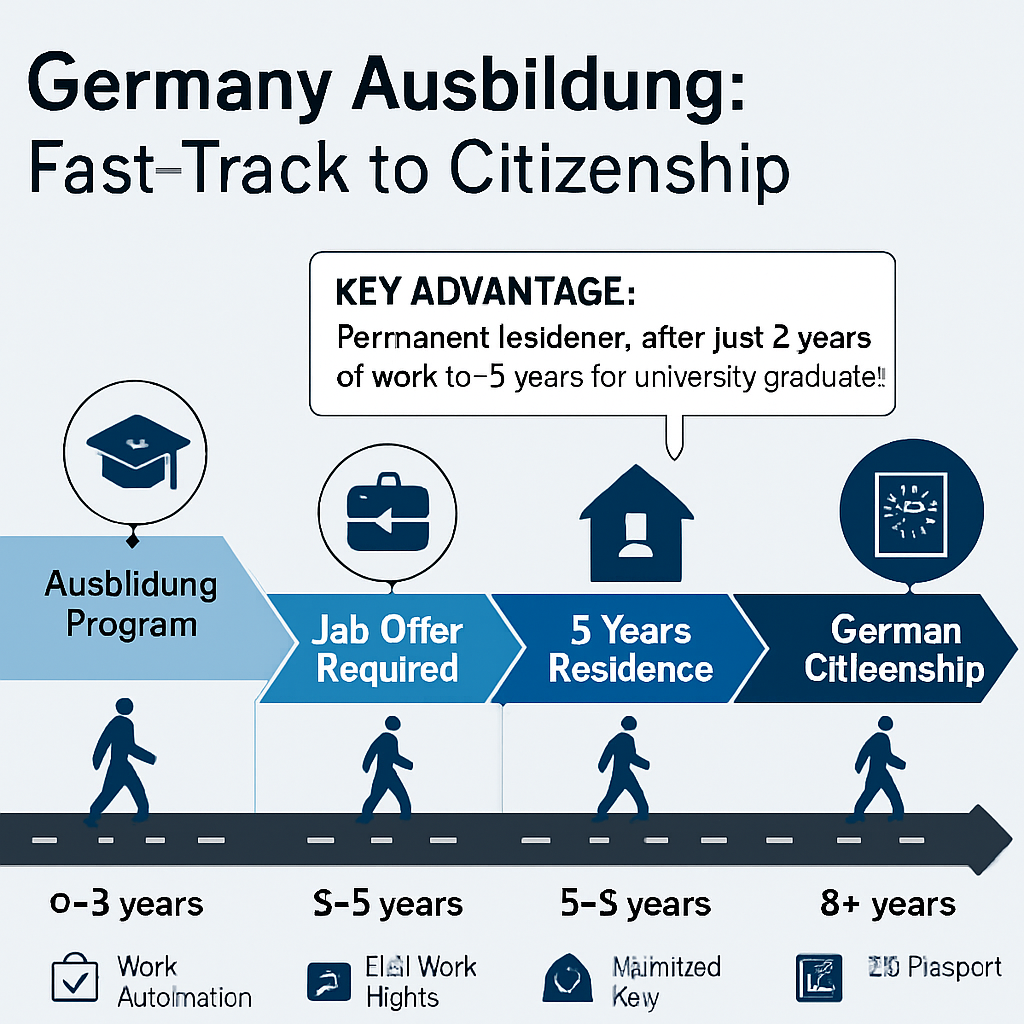
Key advantage: Ausbildung graduates can apply for permanent residency after just 2 years of employment, compared to 5 years for university graduates.
Salary Progression and Career Advancement Potential
Colombian Ausbildung graduates experience predictable salary growth within Germany's structured wage system:
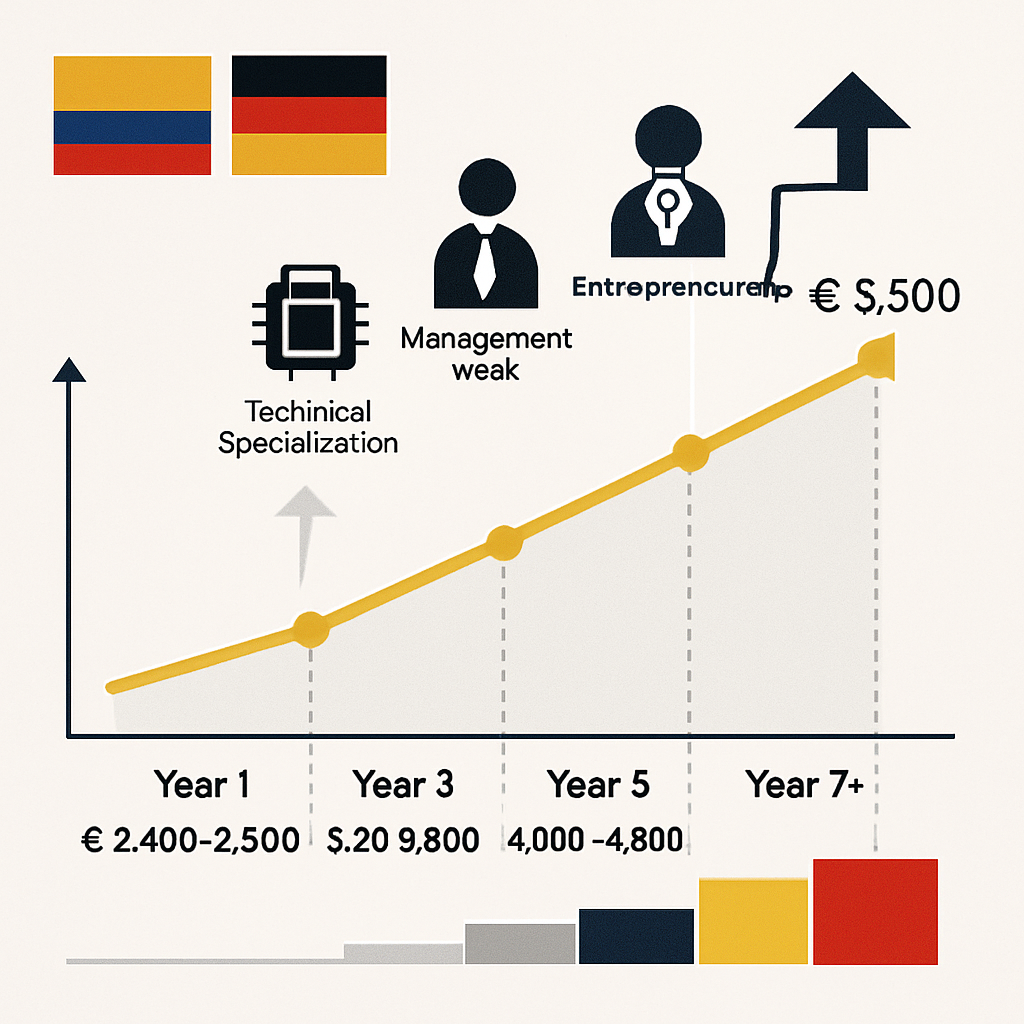
5-Year Salary Progression (IT Specialist example):
Career Advancement Options:
Alternative Routes and Backup Plans
University Pathway Comparisons
While Ausbildung offers immediate employment prospects, Colombian students should understand alternative educational routes:
| Aspect | German Ausbildung | German University | Colombian University + Germany |
|---|---|---|---|
| Duration | 2-3.5 years | 3-4 years | 4-5 years + 1-2 years |
| Total Cost | €8,700-12,000 | €15,000-25,000 | €20,000-30,000 |
| Employment Rate | 92% immediate | 78% within 6 months | 65% within 1 year |
| Starting Salary | €2,400-2,800 | €3,200-4,000 | €2,800-3,500 |
| Visa Complexity | Moderate | High | Very High |
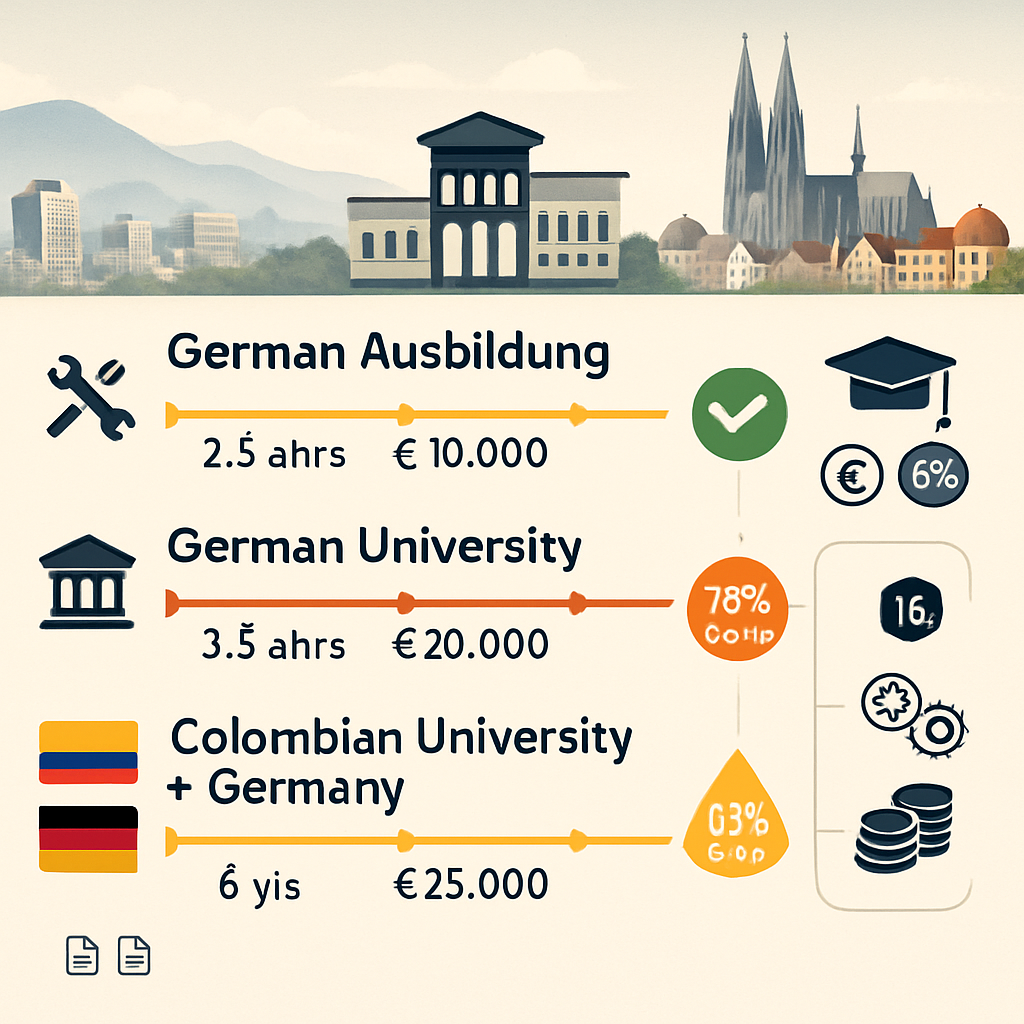
When to Choose University Over Ausbildung:
Other European Ausbildung Programs
Colombia has expanding agreements with additional European countries offering similar dual-education models:
Switzerland:
Austria:
Netherlands:
Return-to-Colombia Opportunities with German Qualifications
German-trained professionals command premium positions in Colombia's evolving economy:
High-Demand Sectors for Returnees:

Salary Advantages in Colombia:
Strategic Return Timeline:
This dual-country strategy allows Colombian professionals to leverage German training while contributing to Colombia's economic development, creating a sustainable bridge between both economies.
Frequently Asked Questions
Question 1: What German language level do I need before applying, and how long does it take to achieve it?
Most Ausbildung programs require B1-B2 German proficiency, with technical fields often accepting B1. From zero German knowledge, expect 12-18 months of intensive study (20+ hours weekly) to reach B1 level. In Bogotá, Goethe Institut courses cost approximately $800-1,200 for A1-B1 progression. Online platforms like Babbel or Deutsche Akademie offer more affordable alternatives at $100-300. Consider combining formal classes with language exchange programs and German media consumption. Start language learning at least 18 months before your intended departure date. Some programs offer preparatory German courses upon arrival, but having solid foundations significantly improves your adaptation and success rates.
Question 2: How do I find and apply to Ausbildung programs from Colombia?
Start your search on official platforms like Ausbildung.de, IHK websites, and Make-it-in-germany.com. Many German companies recruit internationally through job fairs in Bogotá or virtual events. Contact the German Chamber of Commerce in Colombia for networking opportunities. Applications typically require: CV (German format), motivation letter in German, school certificates (apostilled and translated), language certificates, and sometimes aptitude tests. Apply 12-15 months in advance as processing takes time. Popular fields for Colombians include IT, healthcare, hospitality, and engineering. Create profiles on multiple platforms and consider hiring a German CV consultant ($50-100) to improve your application quality.
Question 3: What happens if I don't complete my Ausbildung program successfully?
If you fail or withdraw from your Ausbildung, your residence permit may be terminated, giving you 3-6 months to find alternatives. Options include: transferring to another Ausbildung program, switching to university studies (if qualified), or returning to Colombia. Germany allows one program change without major penalties. To avoid failure, utilize support systems: workplace mentors, integration courses, and student counseling services. Many programs offer additional German language support and academic tutoring. Maintain regular communication with your employer about challenges. Consider that approximately 25% of international students change programs, so having a backup plan is essential. Keep emergency funds for potential program transitions.
Question 4: Can I work part-time during my Ausbildung, and what are the income expectations?
Ausbildung students receive monthly training allowances ranging from €515-1,200 depending on the field and year of training. First-year students typically earn €515-700, increasing annually. You can work part-time (up to 10 hours weekly) with employer permission, earning €10-15/hour. Popular side jobs include tutoring Spanish, restaurant work, or freelance translation. Total monthly income ranges €700-1,000, sufficient for basic living in smaller German cities but tight in Munich or Hamburg. Many students supplement income through weekend work or holiday jobs. Budget carefully as training demands are high. Some employers offer additional benefits like meal vouchers, transportation passes, or accommodation assistance.
Question 5: What are the accommodation options and realistic monthly living costs?
Monthly living costs range €700-1,200 depending on location. Munich/Hamburg cost €1,000-1,200, while smaller cities like Dresden or Erfurt cost €700-900. Accommodation options include: shared apartments (€300-600), student dormitories (€250-400), or host families (€400-500). Many Ausbildung providers assist with initial housing arrangements. Essential monthly expenses: rent (€300-600), food (€200-250), transportation (€60-90), insurance (€100), phone (€20-30), personal expenses (€100-150). Consider buying second-hand furniture and using discount supermarkets like Aldi or Lidl. Many cities offer student discounts for cultural activities and transportation. Plan for higher initial costs including deposits and basic household items.
Question 6: How do I handle homesickness and cultural adaptation challenges?
Cultural adaptation typically takes 6-12 months, with homesickness peaks occurring around months 2-4. German work culture emphasizes punctuality, direct communication, and structured processes - quite different from Colombian flexibility. Join Colombian communities through Facebook groups or cultural associations in major German cities. Maintain regular family contact but establish boundaries to avoid constant comparison. German colleagues may seem distant initially but often become supportive once trust develops. Learn German social customs: greeting protocols, workplace hierarchy, and regional differences. Consider professional counseling if adaptation becomes overwhelming - many cities offer services in Spanish. Embrace local activities like sports clubs or volunteer work to build connections and improve language skills.
Question 7: What documents need apostille and translation, and how long does this process take?
Required documents include: high school diploma, university transcripts (if applicable), birth certificate, criminal background check, and medical certificates. Apostille process in Colombia takes 15-30 business days through the Ministry of Foreign Affairs, costing approximately $25-40 per document. Certified German translations cost €25-50 per page through court-certified translators. Total document preparation takes 2-3 months and costs €300-500. Start early as some documents have validity periods (criminal records expire after 3 months). Keep multiple certified copies as German bureaucracy often requires originals. Some consulates accept digital apostilles, verify current requirements. Consider hiring a gestoría service in Bogotá to expedite the process for approximately $200-300.
Question 8: What health insurance and medical requirements must I meet?
Health insurance is mandatory in Germany, costing approximately €100-110 monthly for students under 30. Public insurance (Gesetzliche Krankenversicherung) covers most needs including dental and emergency care. Private insurance is generally not recommended for Ausbildung students. Required medical examinations include: general health check, tuberculosis screening, and sometimes occupational health assessments for healthcare or food service programs. Vaccinations must be current, particularly measles, mumps, rubella, and tetanus. Bring medical records translated into German. Mental health services are covered but may require referrals. Consider that German healthcare operates differently - appointments are scheduled in advance, and emergency rooms are for genuine emergencies only. Register with a local doctor (Hausarzt) upon arrival.
Conclusion
Your journey from uncertainty to opportunity starts with understanding that the German Ausbildung system isn't just another educational path—it's a proven gateway to financial independence, professional excellence, and global career prospects. As we've explored, Colombian students have successfully navigated this €2,900 investment to transform their lives, earning competitive salaries while gaining world-class vocational training. The stark differences between Colombian and German systems work in your favor: Germany's emphasis on practical skills, employer partnerships, and immediate earning potential creates opportunities that simply don't exist elsewhere.
The financial reality is clear and manageable. That €2,900 investment covers your visa, travel, and initial living expenses—essentially the cost of a semester at many private institutions—but with a guarantee of employment and income from day one. Success stories from Bogotá to Berlin demonstrate that students from diverse backgrounds, regardless of their starting point, have built thriving careers in fields ranging from healthcare to engineering. These aren't isolated cases; they represent a systematic pathway that German employers actively support because they need skilled international talent.
Your hesitations are natural—leaving familiar surroundings, learning a new language, and investing in an unknown system requires courage. However, every successful Ausbildung graduate once stood exactly where you are now, weighing possibilities against fears. The difference between those who succeeded and those who remained uncertain was taking that crucial first step. The German language barrier dissolves with consistent effort, the cultural adaptation happens naturally through immersion, and the initial investment pays dividends within months of arrival.
Don't let another year pass wondering "what if." Start your research today by exploring specific Ausbildung programs that align with your interests, begin gathering required documents, and most importantly, initiate your German language learning journey. GoAusbildung's experienced advisors have guided hundreds of students through this exact process, providing personalized support from application to arrival in Germany. Your future self will thank you for having the courage to pursue this life-changing opportunity. Contact GoAusbildung now—your German success story begins with a single conversation.
About GoAusbildung
Comprehensive resource for guidance on Ausbildung programs in Germany
Ready to Start Your Ausbildung Journey in Germany?
Explore our resources and get personalized guidance to find the perfect Ausbildung program aligned with your career goals.